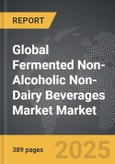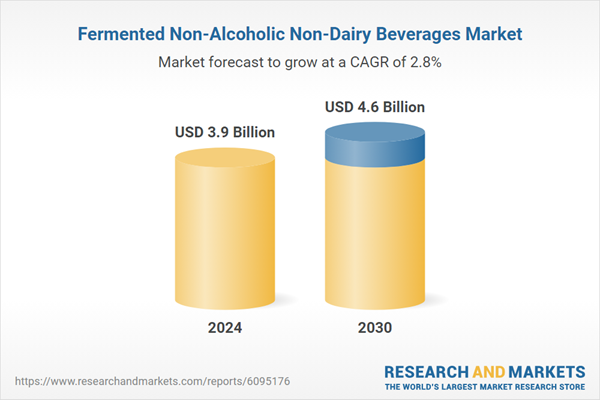Global Fermented Non-Alcoholic Non-Dairy Beverages Market - Key Trends & Drivers Summarized
How Are New Fermentation Techniques Reshaping the Functional Beverage Category?
Innovations in fermentation technology are fueling a major evolution within the non-alcoholic, non-dairy beverage landscape. Advanced microbial cultures, precision-controlled fermentation environments, and optimized enzymatic processes are enabling manufacturers to create shelf-stable, nutrient-dense beverages with enhanced sensory appeal. Modern fermentation techniques allow better modulation of flavor profiles, viscosity, and bioactive compound retention. Instead of relying solely on traditional strains like Lactobacillus or Bifidobacterium, producers are incorporating novel probiotic strains such as Akkermansia muciniphila or Saccharomyces boulardii to target specific gut microbiota functions. These developments are helping beverage companies differentiate their offerings in a saturated functional drinks market.The growing trend of non-dairy fermented alternatives is being catalyzed by biotechnological advancements that enable plant-based substrates like oat, soy, coconut, rice, or cashew milk to ferment efficiently without coagulation or separation. Unlike dairy-based probiotics, these beverages are being developed to meet specific dietary restrictions including vegan, lactose-free, and allergen-free requirements. Manufacturers are also leveraging precision fermentation to introduce postbiotic ingredients that do not require live cultures, thereby enabling extended shelf-life and ease of global distribution. Companies are using data-driven sensory mapping tools to predict optimal taste combinations and guide product innovation pipelines, ensuring alignment with emerging consumer preferences for fermented drinks that are both health-centric and palatable.
What Ingredients and Formats Are Driving the Expansion of Product Lines?
The market for fermented non-alcoholic non-dairy beverages is witnessing a surge in diversity - both in terms of base ingredients and product formats. While kombucha continues to dominate in many Western markets, new entrants like tepache, water kefir, fermented herbal teas, and probiotic fruit punches are gaining traction in both premium and mass-market categories. Coconut water-based and oat-based fermented drinks are especially popular among consumers looking for naturally sweetened, low-calorie, gut-supporting options. Additionally, fermented vegetable juices like beet kvass and cucumber tonics are appealing to health-conscious segments focused on detoxification and hydration.RTD (ready-to-drink) bottles, functional beverage shots, and concentrated liquid sachets are among the fastest-growing formats. These enable precise portion control, convenience, and ease of incorporation into busy lifestyles. Brands are also experimenting with hybrid offerings that combine fermented bases with added botanicals, adaptogens, and prebiotic fibers to cater to multidimensional wellness preferences. A strong interest in clean-label formulations is compelling producers to limit artificial stabilizers, instead exploring natural fermentation-stabilizing techniques using acacia gum, chia gel, or native starch blends. Seasonal flavors and regional fruit infusions - like hibiscus, tamarind, or yuzu - are being introduced to maintain consumer engagement and expand cross-cultural appeal.
How Are Consumer Lifestyles and Retail Channels Shaping Demand?
Urban consumers, particularly millennials and Gen Z, are actively seeking out functional beverages that serve as daily wellness rituals rather than occasional indulgences. This behavioral shift is fostering consistent demand for fermented non-alcoholic non-dairy beverages with gut health, immunity, and skin health claims. Digital wellness communities, lifestyle influencers, and preventive health narratives are amplifying the cultural visibility of these products, especially among flexitarian and health-aware consumers. Customization and transparency are becoming critical purchase drivers, prompting brands to offer detailed strain information, fermentation methods, and QR codes for microbiome content verification.The retail ecosystem is also rapidly evolving to accommodate these shifts. Health food chains, cold-chain specialty stores, and direct-to-consumer (DTC) models dominate distribution in developed markets, while online marketplaces and subscription-based delivery models are gaining momentum globally. In emerging economies, the proliferation of wellness cafés, clean-label bistros, and functional RTD vending machines is enabling better trial access. Importantly, e-commerce platforms are enabling discovery and differentiation, with consumer reviews and AI-driven recommendation engines shaping repeat purchases. Loyalty programs tied to gut health tracking apps are also emerging as new touchpoints between consumers and fermented beverage brands.
What Are the Key Factors Driving Market Expansion Globally?
The growth in the fermented non-alcoholic non-dairy beverages market is driven by several factors, each contributing to its robust global expansion. Rising consumer awareness about digestive wellness, microbiome science, and dietary sensitivities is significantly influencing purchase decisions. The pandemic-induced focus on immunity and preventive health has accelerated trial adoption across all demographics, particularly in urban and semi-urban populations. Regulatory bodies in regions like North America and Europe are beginning to support clear labelling standards for fermented products, further enhancing consumer trust and purchase intent.Another core driver is the increased R&D investment from both established beverage conglomerates and agile startups aiming to differentiate within the functional drinks category. Governmental grants and innovation subsidies in countries focused on sustainable food systems - such as Germany, South Korea, and Japan - are promoting the development of non-dairy fermented alternatives. The presence of diverse distribution channels, growing per capita income, and culturally rooted fermentation traditions in countries like India, Brazil, and Thailand are amplifying regional demand. Coupled with rising veganism and the mainstreaming of plant-based diets, the fermented non-dairy segment is transitioning from a niche wellness trend to a globally scaled category. Market participants are also leveraging packaging innovation and blockchain-based traceability tools to build transparency, extend shelf-life, and reinforce brand credibility in a rapidly evolving competitive landscape.
Report Scope
The report analyzes the Fermented Non-Alcoholic Non-Dairy Beverages market, presented in terms of market value (US$). The analysis covers the key segments and geographic regions outlined below:- Segments: Product Type (Dairy Free Drinkable Yogurts, Fermented Soft Drinks, Fermented Juices, Non-Dairy Kefir, Other Product Types); Source (Fruits Source, Vegetables Source, Cereals Source, Other Sources); Distribution Channel (Supermarkets / Hypermarkets, Convenience Stores, Online Distribution Channel, Other Distribution Channels).
- Geographic Regions/Countries: World; United States; Canada; Japan; China; Europe (France; Germany; Italy; United Kingdom; Spain; Russia; and Rest of Europe); Asia-Pacific (Australia; India; South Korea; and Rest of Asia-Pacific); Latin America (Argentina; Brazil; Mexico; and Rest of Latin America); Middle East (Iran; Israel; Saudi Arabia; United Arab Emirates; and Rest of Middle East); and Africa.
Key Insights:
- Market Growth: Understand the significant growth trajectory of the Dairy Free Drinkable Yogurts segment, which is expected to reach US$1.8 Billion by 2030 with a CAGR of a 2.9%. The Fermented Soft Drinks segment is also set to grow at 3.9% CAGR over the analysis period.
- Regional Analysis: Gain insights into the U.S. market, valued at $1.1 Billion in 2024, and China, forecasted to grow at an impressive 5.4% CAGR to reach $899.8 Million by 2030. Discover growth trends in other key regions, including Japan, Canada, Germany, and the Asia-Pacific.
Why You Should Buy This Report:
- Detailed Market Analysis: Access a thorough analysis of the Global Fermented Non-Alcoholic Non-Dairy Beverages Market, covering all major geographic regions and market segments.
- Competitive Insights: Get an overview of the competitive landscape, including the market presence of major players across different geographies.
- Future Trends and Drivers: Understand the key trends and drivers shaping the future of the Global Fermented Non-Alcoholic Non-Dairy Beverages Market.
- Actionable Insights: Benefit from actionable insights that can help you identify new revenue opportunities and make strategic business decisions.
Key Questions Answered:
- How is the Global Fermented Non-Alcoholic Non-Dairy Beverages Market expected to evolve by 2030?
- What are the main drivers and restraints affecting the market?
- Which market segments will grow the most over the forecast period?
- How will market shares for different regions and segments change by 2030?
- Who are the leading players in the market, and what are their prospects?
Report Features:
- Comprehensive Market Data: Independent analysis of annual sales and market forecasts in US$ Million from 2024 to 2030.
- In-Depth Regional Analysis: Detailed insights into key markets, including the U.S., China, Japan, Canada, Europe, Asia-Pacific, Latin America, Middle East, and Africa.
- Company Profiles: Coverage of players such as Anchor Marine Supplies Pte Ltd, Compass Marine, DINTEC Co., Ltd., Dolphin Marine Suppliers SA, English Braids Ltd. and more.
- Complimentary Updates: Receive free report updates for one year to keep you informed of the latest market developments.
Some of the 44 companies featured in this Fermented Non-Alcoholic Non-Dairy Beverages market report include:
- Acid League
- AGM Foods Pty Ltd
- Athletic Brewing Company
- Bionade GmbH
- Brew Dr. Kombucha
- Califia Farms
- Danone S.A.
- Döhler GmbH
- DuPont de Nemours, Inc.
- Elmhurst 1925
- Fentimans Ltd.
- Flying Embers
- French Bloom
- General Mills, Inc.
- Good Karma Foods
- GT's Living Foods
- Hain Celestial Group Inc.
- Health-Ade Kombucha
- Humm Kombucha LLC
- KeVita Inc.
This edition integrates the latest global trade and economic shifts into comprehensive market analysis. Key updates include:
- Tariff and Trade Impact: Insights into global tariff negotiations across 180+ countries, with analysis of supply chain turbulence, sourcing disruptions, and geographic realignment. Special focus on 2025 as a pivotal year for trade tensions, including updated perspectives on the Trump-era tariffs.
- Adjusted Forecasts and Analytics: Revised global and regional market forecasts through 2030, incorporating tariff effects, economic uncertainty, and structural changes in globalization. Includes historical analysis from 2015 to 2023.
- Strategic Market Dynamics: Evaluation of revised market prospects, regional outlooks, and key economic indicators such as population and urbanization trends.
- Innovation & Technology Trends: Latest developments in product and process innovation, emerging technologies, and key industry drivers shaping the competitive landscape.
- Competitive Intelligence: Updated global market share estimates for 2025, competitive positioning of major players (Strong/Active/Niche/Trivial), and refined focus on leading global brands and core players.
- Expert Insight & Commentary: Strategic analysis from economists, trade experts, and domain specialists to contextualize market shifts and identify emerging opportunities.
Table of Contents
Companies Mentioned (Partial List)
A selection of companies mentioned in this report includes, but is not limited to:
- Acid League
- AGM Foods Pty Ltd
- Athletic Brewing Company
- Bionade GmbH
- Brew Dr. Kombucha
- Califia Farms
- Danone S.A.
- Döhler GmbH
- DuPont de Nemours, Inc.
- Elmhurst 1925
- Fentimans Ltd.
- Flying Embers
- French Bloom
- General Mills, Inc.
- Good Karma Foods
- GT's Living Foods
- Hain Celestial Group Inc.
- Health-Ade Kombucha
- Humm Kombucha LLC
- KeVita Inc.
Table Information
| Report Attribute | Details |
|---|---|
| No. of Pages | 389 |
| Published | January 2026 |
| Forecast Period | 2024 - 2030 |
| Estimated Market Value ( USD | $ 3.9 Billion |
| Forecasted Market Value ( USD | $ 4.6 Billion |
| Compound Annual Growth Rate | 2.8% |
| Regions Covered | Global |









